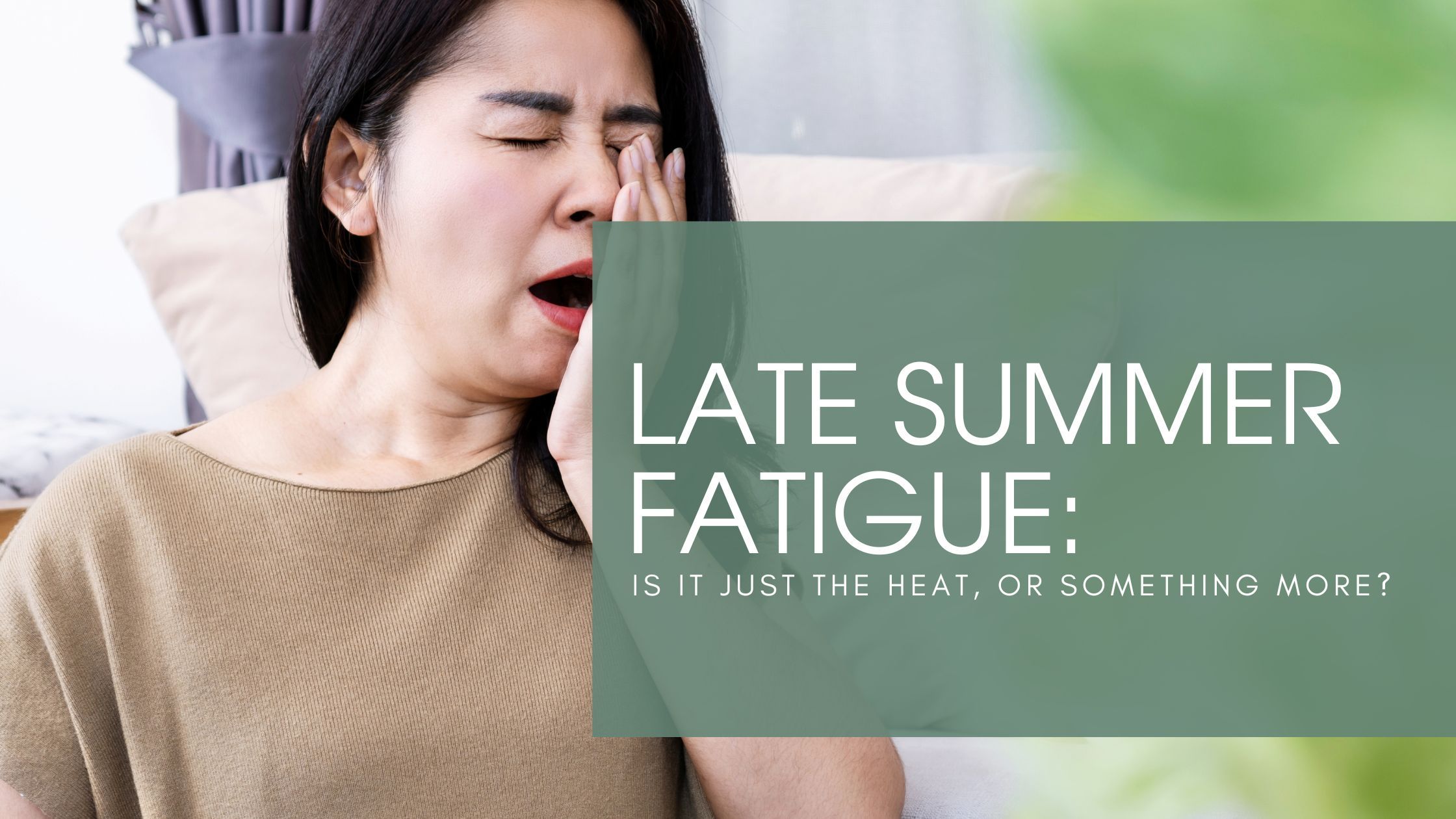
Late Summer Fatigue: Is It Just the Heat, or Something More?
Jul 28, 2025Its August, the sun is relentless, the days are long, and the to-do lists can feel endless.
If you’re finding yourself more tired than ever, you’re not alone. Many people assume fatigue this time of year is simply from the heat or an overbooked schedule.
But what if your low energy isn’t just about summer?
Sometimes, persistent fatigue is your body’s way of saying: “Pay attention.”
Let's break down why you might feel so drained, how to tell when it’s time to check in with your healthcare provider, and simple ways to start reclaiming your energy. So you can enjoy every drop of summer.
Possible Reasons You’re Feeling Extra Fatigue
- Heat and Dehydration
High temperatures and humidity put extra strain on your body. Even mild dehydration can make you feel sluggish, dizzy, and foggy. - Poor Sleep
Long daylight hours can disrupt your sleep cycle, especially if you’re going to bed later. Add in hormonal shifts or sleep apnea, and restorative sleep becomes even harder. - Nutrient Deficiencies
Many middle-aged women are low in iron or vitamin B12. Even slight deficiencies can sap your strength. Men may experience fatigue from low vitamin D. - Thyroid Imbalance
An underactive thyroid (hypothyroidism) is a common cause of fatigue, weight gain, and brain fog in women over 40. - Chronic Stress and Burnout
Juggling work, family, and life transitions can trigger chronic stress and eventually, or burnout. - Undiagnosed Medical Conditions
Conditions like diabetes, heart disease, or anemia often develop gradually. Fatigue is often one of the earliest clues.
How Age and Hormones Affect Energy
Fatigue in midlife often has multiple causes, and hormonal shifts can play a big role for both women and men.
For women, common contributors include:
- Iron deficiency anemia is common around perimenopause, especially if you have heavy periods.
- Hypothyroidism (an underactive thyroid) can cause tiredness, weight gain, and brain fog.
- Perimenopause and menopause bring fluctuating estrogen, progesterone, and testosterone which can disrupt sleep and leave you feeling drained.
If you’re experiencing heavy periods, mood changes, or unexplained weight shifts along with fatigue, it’s time to discuss labs with your doctor.
For men, the following conditions are often linked to low energy:
-
Low testosterone can gradually lower energy, mood, and muscle strength.
-
Sleep apnea is often undiagnosed, particularly if you snore or wake up unrefreshed.
-
Metabolic changes, such as insulin resistance, can develop slowly over time and cause fatigue.
These issues are often underdiagnosed, but they can be effectively treated once identified.
*If you're feeling unusually tired and can't pinpoint a clear reason, it's worth looking at the whole picture including hormones, nutrition, and sleep quality.
Midlife is a common time for these shifts to emerge, and addressing them early can make a big difference in how you feel day to day.
When Should You See a Doctor About Fatigue?
If you have any of these red flags, call your healthcare provider promptly:
- Severe or worsening weakness
- Shortness of breath
- Chest pain
- Unintentional weight loss
- New or severe headaches
Otherwise, if fatigue has lasted more than a few weeks despite good sleep and hydration, it’s worth a check-up to look for underlying causes.
Practical Tips to Help Improve Fatigue
While it's important to identify any underlying medical issues, there are also simple daily habits that may help support your energy levels:
-
Stay well hydrated
Even mild dehydration can lead to low energy and brain fog. Aim for around 64 ounces of water daily, and more if you're active or out in the heat. -
Support better sleep
Stick to a consistent bedtime, limit screen time in the evening, and create a cool, dark environment to help improve sleep quality. -
Eat for steady energy
Focus on meals that include protein, fiber, and healthy fats to prevent energy crashes. Include iron-rich foods, leafy greens, and whole grains. -
Move your body daily
Gentle movement like walking, stretching, or light strength work can actually help reduce fatigue and improve mood. -
Find moments to reset
Chronic stress is exhausting. Try deep breathing, meditation, or taking 10 quiet minutes to yourself each day.
These steps won’t fix everything, but they may help you feel a little better while you’re getting to the root of the issue.
And if your fatigue persists...
We’re Here to Help
Feeling tired doesn’t have to be your new normal.
Whether you’re navigating hormonal changes, nutritional gaps, or hidden medical conditions, we take time to uncover why you feel this way and create a plan to help you feel more like yourself.
Already a patient and ready to regain your energy?
Schedule a visit with your personal physician today.
We’ll take time to understand your symptoms, order any appropriate lab tests, and work with you on a personalized plan to help you feel your best again.
Not yet a patient with us?
Curious about how you can start feeling more energized?
Schedule a free consultation today we’d love to connect with you!
